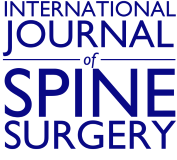Abstract
Background Diabetes as an independent driver of peri-operative outcomes, and whether its severity impacts indications is conflicted in the research. The purpose of this study is to evaluate diabetes as a predictor for postoperative outcomes in cervical spondylotic myelopathy (CSM) patients.
Methods A retrospective review was performed of patients treated surgically for CSM (ICD-9 721.1) from 2010-2012 in the prospectively-collected American College of Surgeons National Surgical Quality Improvement Program (NSQIP) database. Outcome measures were length of stay, and the presence of complications. Diabetic patients were stratified based on whether or not their diabetes was insulin- or non-insulin-dependent.
Results A total of 5,904 surgical CSM patients were included, 1101 (19%) had diabetes. 722 (65%) were non-insulin-dependent diabetics, and 381 (35%) were insulin-dependent diabetics. Diabetes was found to be an independent predictor of extended LOS (OR: 1.878[2.262-1.559], p<0.001) as well as of developing a complication (OR: 1.666[2.217-1.253], p<0.001) after controlling for associated variables like BMI. Type of diabetes (insulin- vs. non-insulin-dependent) showed little significant difference between the groups (p>0.05), however, patients with insulin-dependent diabetes were associated with an increased incidence of wound complications (p=0.027); severity of diabetes was not associated with any other individual complications.
Conclusions Type and severity of diabetes is not a predictor for complication. Diabetes is associated with extended LOS and peri-operative morbidity. Level of evidence: Class 2b. Clinical relevance: Our findings support the view of many spine surgeons, who believe that diabetes has a negative impact on the outcome of surgery for CSM. Our findings support those cohort studies that found an association between diabetes and worst post-operative outcomes following surgical treatment of CSM. These findings lend support to the importance of monitoring preoperative serum glucose levels, as prevention of peri-operative hyperglycemia has been linked to improved postoperative outcomes in spine, joint and colon surgery.
- Copyright © 2017 ISASS - This manuscript is generously published free of charge by ISASS, the International Society for the Advancement of Spine Surgery






